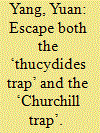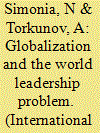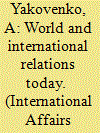|
|
|
Sort Order |
|
|
|
Items / Page
|
|
|
|
|
|
|
| Srl | Item |
| 1 |
ID:
160244


|
|
|
|
|
| Summary/Abstract |
The ‘Thucydides trap’ exaggerates the risk of war breaking out between the rising power and the ruling power in the contemporary age. The greater challenge facing China and the United States is to avoid falling into the ‘Churchill trap’. That is, falling into a long-term confrontation by repeating the mistakes of the Cold War between the US and the USSR. Both the ‘old’ history of the ancient East Asian bipolar system and the current experience of Sino-US interaction in East Asia suggest that, in addition to hegemonic war and cold war, there is a third type of great power relationship between the two poles, which I call ‘co-ruling’, whereby rather than being geographically demarcated according to their respective ‘spheres of influence’, the two superpowers jointly lead all or most of the small and medium-sized countries in the system. The theoretical and case studies examined in the article imply that the ‘co-ruling’ mode will appear and be sustained at a time when the two superpowers’ foreign functions are differentiated (i.e. each of the two poles can only meet one of the indispensable needs of small countries, and the two needs that the two poles can respectively meet are different ones), when inter-great-power war is no longer a viable strategic option. The antagonistic and geopolitical colours of the Cold War ‘divided-ruling’ mode of power politics will be less strident in the ‘co-ruling’ mode, so offering an illuminating escape from both the ‘Thucydides trap’ and the ‘Churchill trap’.
|
|
|
|
|
|
|
|
|
|
|
|
|
|
|
|
| 2 |
ID:
125012


|
|
|
|
|
| Publication |
2013.
|
| Summary/Abstract |
THE BIPOLAR SYSTEM of international relations tumbled down unexpectedly leaving behind at least two consequential factors which for a long time remained ignored and/or deliberately pushed aside by many international players. First, the world no longer needed any state with a status of superpower, a product of ideological confrontation of two systems (two camps, in the Cold War parlance). Second, the trend toward a multipolar world (which had appeared and had been developing for some time behind the screen of bipolarity) became obvious. Still gaining strength (the process will take more than one decade to be completed) it ran into a wall of skepticism. For a long time, skeptics of all hues refused to recognize the obvious and piled one argument on another in an effort to disprove what they called the concept of multipolarity. Truth be said, this is not a concept - this is reality which explains why the American idea of unipolarity picked up by its supporters in other countries (Russia among them) promptly went out of fashion. Revived bipolarity came into vogue together with the global crisis and expectations that China's rapidly growing economy which responded to the world crisis by a slight drop of GDP (from 10% to 7.58%) and its rapidly mounting military might will make it one of the poles instead of the Soviet Union. There is a lot of talk about a "new type of capitalism" that challenges the Western capitalist countries and that outstrips them one after another. Having pushed Japan from its second place in world economy China is pushing forward toward America's first place. The larger part of expert community, including experts of the UN and other international organizations, is convinced that this is merely a matter of time. This is another myth with no serious or solid scientific foundation: superficial and formal comparison of statistics (GDP or even per capita GDP) which implies that the world is uniform cannot be taken for the starting point.
|
|
|
|
|
|
|
|
|
|
|
|
|
|
|
|
| 3 |
ID:
127473


|
|
|
|
|
| Publication |
2013.
|
| Summary/Abstract |
TODAY, when the fifth year of the global financial and economic crisis is drawing to a close, no one has any doubts that the world has entered a period of radical transformation. The crisis of Soviet society and the social system, which brought about an end of the Cold War between the 1980s and the 1990s, has now been supplemented by a crisis of Western society, including a liberal economy and broad representative democracy. So, systemic setbacks in the Euro-Atlantic region - and these two models reflect the collective experience of public development across the space of European civilization, ensuring its domination in the global economy, politics and finances within the framework of a bipolar system - have become key elements of the global crisis. In essence, a line was drawn under a prolonged cycle of historical development that had started with the catastrophe of World War I. And just as the 20th century began in 1914, so it could be argued that the 21st century began with 2008, when the crisis erupted.
|
|
|
|
|
|
|
|
|
|
|
|
|
|
|
|
|
|
|
|
|